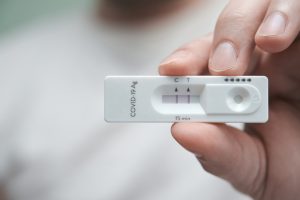 COVID-19 is better controlled now than when it first emerged. However, it still remains a widespread health risk.
COVID-19 is better controlled now than when it first emerged. However, it still remains a widespread health risk.
Even though vaccines have given healthcare centers like Flushing Hospital a much greater capacity to prevent and treat COVID-19 now than at the height of the pandemic more than two years ago, you may still be at risk for reinfection even if you’ve already contracted and recovered from the virus.
While it’s true that a previous case of COVID gives you a level of protection against reinfection, it does not make you immune to the virus. According to the Centers for Disease Control, research is ongoing when it comes to what factors make someone more likely to be reinfected or how reinfections impact their risk of transmitting the virus to other people.
Reinfection of COVID is less likely to be severe than a person’s initial infection, though more severe exceptions do exist. It’s unclear at this time what causes some cases of reinfection to present worse symptoms than others.
It also isn’t clear how frequently reinfection may occur. However, research from the National Institutes of Health suggests that people who receive a positive result on an antibody test may be at a lower risk level of re-contracting the virus over an extended period of time. It also suggests that reinfection may most likely occur within a 90-day timeframe of your initial infection.
Though many elements of reinfection require further study, these cases are treated and prevented in the same way as initial infections.
Boosted vaccination remains the most effective measure of protection against contracting the virus, including cases of reinfection. Maintaining six feet of distance from other people, wearing a mask in indoor public places, regularly disinfecting your hands and surfaces you frequently touch, and getting tested when you’ve been exposed to the virus all also remain effective ways of preventing the spread of all COVID cases.
If you haven’t received your full vaccination or boosters, schedule an appointment as soon as possible.
All content of this newsletter is intended for general information purposes only and is not intended or implied to be a substitute for professional medical advice, diagnosis or treatment. Please consult a medical professional before adopting any of the suggestions on this page. You must never disregard professional medical advice or delay seeking medical treatment based upon any content of this newsletter. PROMPTLY CONSULT YOUR PHYSICIAN OR CALL 911 IF YOU BELIEVE YOU HAVE A MEDICAL EMERGENCY.
